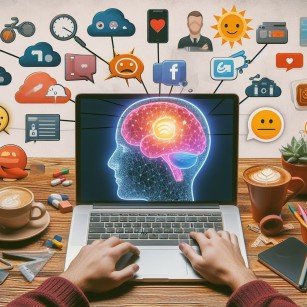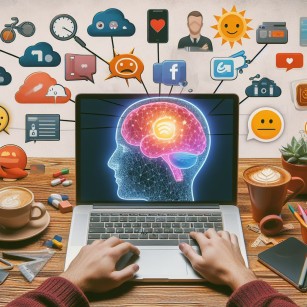In the fast-paced digital age, social media has seamlessly woven into our daily lives, prompting the question: How does social media affect mental health? It’s not just a tool for staying connected; it’s our window to the world, a platform for self-expression, and a source of both joy and concern. In this exploration, we embark on a journey to understand the dynamic relationship between social media and our mental health.
Why Dive In This Article?
Explore the intricate relationship between social media and mental health. Uncover the positive and negative impacts, gaining insights into fostering well-being online. Whether seeking understanding or practical tips, this article is your guide to navigating the complex landscape of social media’s influence on mental health.
The Bright Side of Social Media
Social media brightens our lives, connecting us globally and offering a canvas for creativity. It fosters relationships, provides valuable information, and empowers self-expression, positively impacting our mental well-being. In this digital realm, social media stands as a beacon of connection and creativity.
Building Bridges: Fostering Connections
Picture this: You’re in one corner of the globe, and your friend is in another. Yet, with a few clicks, you’re instantly connected, sharing stories, laughter, and the ups and downs of life. Social media, at its core, serves as a virtual meeting ground, breaking down geographical barriers and fostering connections that might otherwise dwindle.
The Knowledge Hub: Access to Information and Resources
Beyond the sea of memes and cat videos, social media harbors a treasure trove of information. It’s a hub where users can educate themselves about mental health, find support groups, seek expert advice, and discover coping mechanisms. This positive side contributes significantly to raising awareness and understanding mental health issues.
Your Canvas, Your Story: Promoting Expression and Creativity
Scroll through your feed, and you’ll find a myriad of expressions – from captivating artwork to heartfelt captions. Social media platforms provide a canvas for self-expression, allowing users to showcase their creativity and, in turn, boost their mental well-being by cultivating a sense of accomplishment and self-worth.

How Does Social Media Affect Mental Health
Shadows in the Social Media Spotlight: Negative Side of the Virtual World
As we bask in the social media spotlight, shadows emerge—comparison triggering self-esteem dips, cyberbullying casting dark clouds, and the fear of missing out inducing stress. Explore these shadows to navigate the digital landscape consciously, understanding the pitfalls that can impact our mental well-being.
Picture-Perfect Pitfalls: Comparison and Self-Esteem
While social media offers a glimpse into others’ lives, it often showcases curated, seemingly perfect narratives. This constant exposure can lead to unhealthy comparisons, triggering a decline in self-esteem as users measure their lives against an idealized standard. It’s a pitfall we often find ourselves navigating in the pursuit of happiness.
The Cyber Shadows: Cyberbullying and Harassment
The veil of anonymity that social media provides can embolden individuals to engage in cyberbullying. This form of digital harassment can cast a dark shadow on mental health, leaving victims grappling with its profound consequences. It’s a stark reminder of the responsibility that comes with the power to communicate from behind a screen.
The Fear Factor: Fear of Missing Out (FOMO)
In the vast expanse of the digital world, the Fear of Missing Out (FOMO) silently but powerfully asserts its influence. Social media inundates us with a constant flow of updates, showcasing others’ experiences, events, and achievements. Amid this digital deluge, a profound anxiety about being left out can quietly seep in. This fear becomes a catalyst for stress and feelings of inadequacy, underscoring the crucial importance of individuals consciously managing their online engagement. Recognizing and addressing FOMO is a key step in safeguarding mental well-being in the digital age.
Information Overload and Mental Fatigue
The constant stream of information on social media platforms can lead to information overload, contributing to mental fatigue. Endless scrolling, notifications, and the pressure to stay constantly connected can overwhelm users, impacting their ability to focus, concentrate, and maintain a healthy mental state. Recognizing the signs of digital fatigue is crucial in mitigating these adverse effects.
Striking a Balance: Navigating the Shadows
While social media offers a myriad of positive experiences, acknowledging and navigating its darker aspects is essential for maintaining mental well-being. Setting boundaries, being mindful of online interactions, and fostering a conscious approach to digital engagement are key strategies in navigating the shadows of social media and emerging with a healthier relationship with the digital world.
Finding Equilibrium in the Digital Age
Amid the digital chaos, discovering equilibrium becomes essential. Set boundaries by managing screen time and curating content to maintain a healthy balance between the digital and real worlds. Cultivate well-being by unfollowing toxicity, engaging in positive online communities, and consciously shaping a digital space that uplifts your mental health. This quest for equilibrium is your compass in the ever-evolving landscape of the digital age.
Drawing Boundaries: Setting Limits
Acknowledging the potential pitfalls, it becomes crucial to draw clear boundaries. Establishing specific time limits for social media use and being mindful of the content consumed can go a long way in maintaining a healthy balance between the digital and real worlds.
Crafting Your Digital Haven: Cultivating Well-Being
In the vast landscape of social media, there’s an opportunity to shape your online experience consciously. Unfollowing toxic accounts, engaging in positive communities, and filtering content are proactive steps toward cultivating digital well-being. It’s about curating a space that uplifts rather than dampens your mental health.
Wrap-Up Time: Navigating the Social Seas
In the grand scheme of things, the impact of social media on mental health is intricate and multi-faceted. It’s a journey with peaks of connection and valleys of comparison, but with a mindful approach, we can navigate these social seas successfully. Striking a balance and cultivating digital well-being emerge as our compass, ensuring that our online experiences contribute positively to our mental health journey. So, let’s set sail, embracing the digital horizon with awareness, resilience, and a commitment to our well-being.
Frequently Asked Questions (FAQs) for How Does Social Media Affect Mental Health
Q: How does social media impact mental health?
A: Explore the diverse ways social media influences mental well-being, from fostering connections to potential pitfalls like comparison and cyberbullying.
Q: What are the positive aspects of social media on mental health?
A: Discover the bright side, including building virtual connections, accessing mental health resources, and providing a platform for creative expression.
Q: How can I navigate the negative aspects of social media?
A: Gain insights into setting boundaries, managing screen time, and cultivating digital well-being to mitigate the adverse effects of social media.
Q: What is the Fear of Missing Out (FOMO) and its impact on mental health?
A: Understand FOMO and its role in inducing stress and feelings of inadequacy, shedding light on its influence in the digital realm.
Q: How can I find balance in the digital age?
A: Learn practical tips for striking a balance between online and offline life, ensuring a healthier relationship with social media.
Q: What steps can I take to enhance my digital well-being?
A: Discover proactive measures, such as unfollowing toxic accounts, engaging in positive communities, and consciously curating a digital space that uplifts mental health.
Q: Why is it important to address mental health concerns related to social media?
A: Understand the significance of acknowledging and addressing mental health concerns arising from social media use, emphasizing the need for a mindful approach.
Q: Can social media be a positive influence on mental health?
A: Yes, explore the affirmative impact of social media on mental well-being, including its role in fostering connections, disseminating information, and promoting creativity.
Q: How can I use social media responsibly without negatively impacting my mental health?
A: Find practical strategies for responsible social media use, including time management, content curation, and engagement in positive online spaces.
Q: What role does comparison play in the negative effects of social media on mental health?
A: Examine the pitfalls of comparison in the digital age, understanding its impact on self-esteem and mental well-being.
